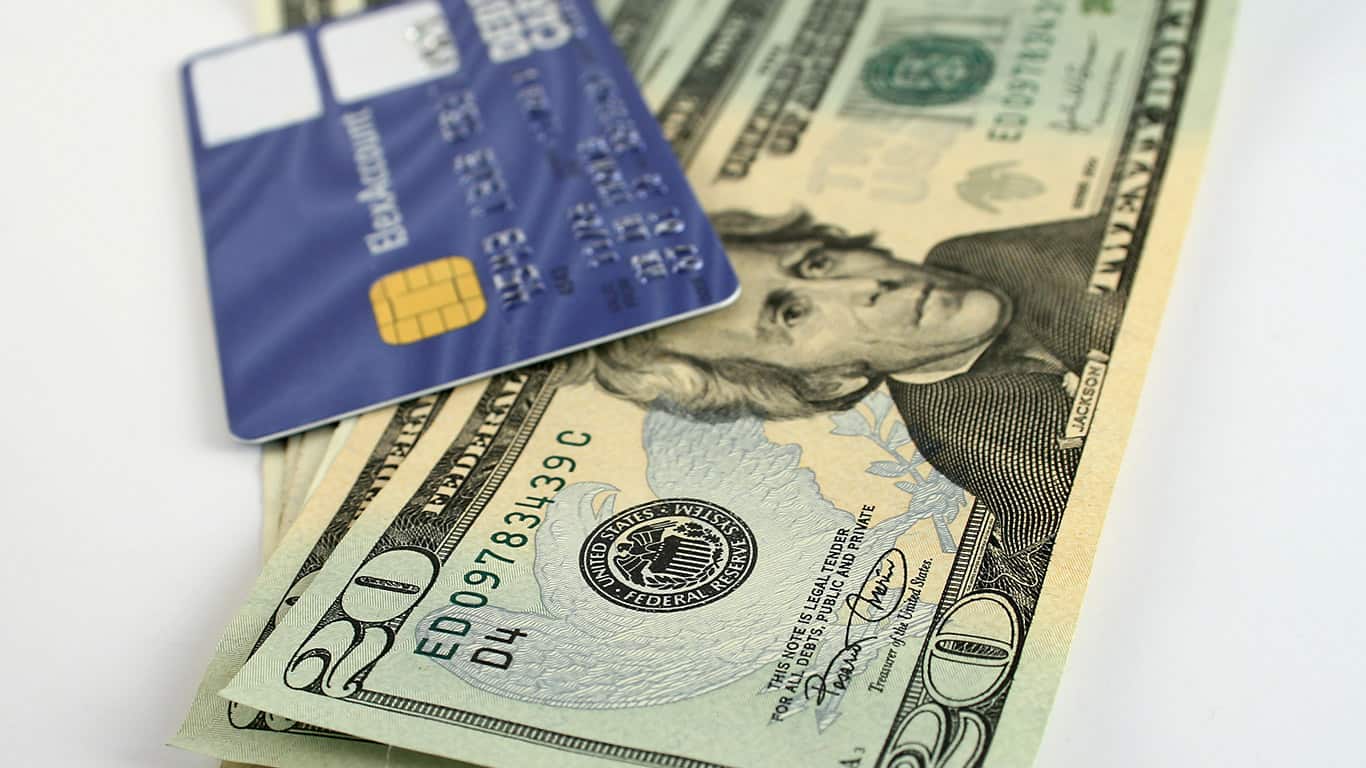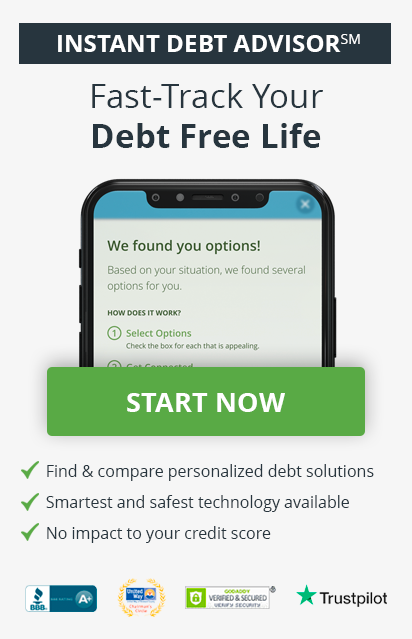It’s a costly debt you generally should avoid – here’s why
The thought of having cash in hand as soon as you need it is appealing, but not when it comes with a price tag. It’s literally less bang for your buck.
Imagine going to the grocery store and handing the clerk a loaf of bread. You pay full price – only for him to remove a few slices and hand it back to you. That’s essentially what happens over time when you borrow cash from your credit card.
Most credit cards allow you to withdraw money at an ATM or cash a blank check, then pay it back over time. This process comes with hefty fees, and it’s commonly known as a “cash advance.”
A cash advance is NOT the same as withdrawing money from your checking or savings account – which is accessing money you already have sitting in the bank. Borrowing cash from your credit card is like taking out a loan, and it will cost you in more ways than one:
- Flat fee or percentage – can range from $5 to $12 or 3% to 8% of the amount borrowed
- Higher interest rate – current average is 24.81% but it can run as high as 36% or more
- ATM fees – typically there’s a charge to withdraw money from out-of-network banks and cashpoints
How a cash advance works
On the surface, a credit card cash advance works similarly to how you access funds with a debit card. Just insert your card into an ATM, enter your pin, and voila! The machine magically spits out your money. You can also cash a “convenience” check (a blank check furnished by the credit card company) or go inside the bank to initiate a cash advance. But this is where the similarities end. The fees associated with a credit card cash advance make this type of transaction way more expensive than using your debit card.
What you can borrow is determined by your credit limit and what’s left to spend. The average amount is 20% or 30% of the available credit limit, while some credit cards allow upwards of 50%. That percentage is determined by your credit card company.
When you’re in need of quick cash, a cash advance may seem like a convenient option – and it can be a smarter financial move compared to payday loans or other high-interest lending tools. But before you consider a cash advance to cover an emergency or surprise expense, let’s explore some budget-friendly alternatives…
Need cash? You have other options
If you absolutely need cash, there are alternatives to a cash advance.
Consider selling items to cover the cost, using a service like Declutter or OfferUp. Old technology you’re not using anymore can be sold for cash using apps like Gazelle.
If you have good credit and a good history with your bank, consider getting a personal loan. This will have a fixed rate of interest, and repaying on time will boost your credit rating. Don’t go to a payday loan store or use other “easy money” options.
Begin an emergency savings account as soon as possible to avoid having to borrow for emergencies. Make sure your checking account is balanced before you pay bills, and have it tied to a savings account rather than a credit card.
Tip: Start a small savings accounts for emergencies. With just $25 per week, you would have $1,300 at the end of the year – more than enough for surprise home and auto repairs. Never use credit card cash advances to pay off other debt. It’s far better to start a budget and build savings to handle those types of emergencies.Types of cash advances
You may think that only going to an ATM to take out cash would be considered a cash advance. But there are other types of transactions that most card issuers consider to be cash advances.
- ATM withdrawals – These are the type of transactions most people think about when using their credit card to access cash. This should not be confused with using a debit card to withdraw cash.
- Overdraft protection – When you link your credit card to your checking account to avoid overdraft fees (coverage for checks or online payments when you don’t have enough of a balance), the “overdraft protection” is treated the same as a cash advance. Not all overdraft protection is treated as a cash advance. A banking customer can use a savings account instead of a credit card to cover overdrafts. There may be fees with either method, but using a savings account will be far less expensive and won’t have interest charges.
- Gambling Transactions – Using your credit card (when allowed) for gambling is most often treated as a cash advance. Many casinos do not allow you to use cards other than to get cash advances at their ATMs.
- Gift Cards – Purchasing gift cards CAN BE considered a cash advance if you buy them directly from a financial institution. Still, generally, buying a gift card is treated as a regular purchase if you buy them at your local grocery store.
- Credit card checks – The convenience checks that often come with a new credit card can be treated the same as cash advances. It’s best to shred them.
- Buying foreign currency – Buying the local currency in another country can be treated the same as a cash advance and subject to the same charges, plus a currency conversion fee that might be as high as 3%.
- Cryptocurrency – Many credit card companies treat cryptocurrency purchases the same as cash advances. Others don’t allow it at all because of a high potential for fraud. Some cryptocurrency exchanges also charge extra fees for using credit cards.
- Transferring between accounts – Transferring money from a credit card to a bank account is also considered a cash advance.
Cash advance pros and cons
When you don’t have enough money to cover the rent, pay the mortgage or make your car payment, it may be tempting to run to the nearest ATM and take out a cash advance on your credit card to help you get by. A cash advance may not be your best option, however.
| Pros | Cons |
|---|---|
| • Quick and easy loan | • Very high fees/interest rates |
| • Available anytime | • Can affect credit utilization |
| • No application needed | • Interest starts on the first day |
Remember, you’ll have to pay a fee
You always have to pay more for convenience, and grabbing cash charged to your credit card from the nearest ATM is no exception. So, how much will you pay for convenient cash?
Your credit card company may charge an upfront fee – usually 5% of the amount advanced or $10, whichever is higher.
If your cash advance transaction is at an ATM, the bank you withdraw money from may also charge its own service fee.
Brace yourself for a higher interest rate
One thing you can expect with a credit card cash advance is that you’ll pay a higher interest rate than you pay on new purchases with that same card. In fact, interest rates for some credit cards are more than 25%.
A cash advance can hurt your credit score
When you raise your credit utilization rate, your credit score can suffer. Cash advances do impact your utilization rate. This rate measures the amount of the available credit limit you are currently using. Anything above 30% will hurt your credit score, so borrowing a large sum of money with an advance can quickly increase your utilization rate, just like a big purchase would.
Credit card payments may go toward earlier purchases
Keep in mind that when you make your next credit card payment, the payment might go towards paying for purchases with a lower interest rate first.
Meanwhile, you’ll keep on paying that higher interest rate on your cash advance while your payments are applied to outstanding purchases accruing less interest.
Find out: Can I Pay Off My Credit Card With Another Credit Card?
Know your cash advance limit
Your credit card will likely have an advance limit, which is borrowed against your card’s total credit limit. To find out your card’s advance limit, look at your credit card statement or online account information. Also, make sure that charging a cash advance won’t push your total balance to an amount that exceeds the card’s credit limit.
Don’t expect a grace period
When you make new purchases with a credit card, you have up to a one-month grace period to pay them off before the credit card issuer begins charging interest on the charges. That’s often not the case with credit card cash advances, which can begin accumulating interest right away.
That convenience check is a cash advance
When you use the blank “convenience check” that your credit card company may send in the mail, that transaction works like a cash advance. That means you’ll typically pay fees and a higher interest rate while receiving no grace period on the accumulated interest.
Cashing a convenience check for a large amount could also bump your balance up so you exceed your card’s credit limit, incurring more expense with a penalty fee.
Find out: Can I Use Cash Advances to Pay Off Student Loans, Then Declare Bankruptcy?
Other ways that credit card cash advances can hurt you
Having high balances on your credit card can hurt your credit rating and is very expensive. You also run the risk of having your debt get out of control and sent to collectors. Bill collectors can pursue legal actions, including wage garnishment. By the way, if a bill collector claims they can arrest you and send you to prison, they are lying, no one in the USA has been sent to jail for debt since the 1830s, but you do need to follow any court orders. If your credit card debt is difficult to handle, there are many resources you can use.
Additionally, if you are unemployed and in debt, here are some options.
Why cash advances are expensive
Typically a $500 advance can cost you almost $100 by the time you have paid all the fees and interest. Even if you paid it in full the next month, you’d still have fees, interest from the time of withdrawal, and the ATM fee. Keep in mind that interest compounds daily, meaning it adds up quickly.
| Terms | Cost |
|---|---|
| Cash advance withdrawal | $500 |
| Monthly payment | $50 |
| Cash advance fee (5%) | $25 |
| Cash advance APR (26.74%) | $72 in interest |
| ATM fee | $2.50 |
| Estimated time to pay off the cash advance | 12 months |
| Total interest and fees | $99.50 |
Credit card cash advances vs debit cards
When you use a debit card or credit card to purchase something or even get cash, they both work the same upfront. You enter your card into an ATM, put in your PIN and take out cash, or purchase online or in a store.
Beyond that, what happens after the withdrawal or transaction is significantly different. When you take out money using a debit card, it’s automatically deducted from your bank account, and there are no fees other than a possible out-of-network ATM fee.
Using a credit card to purchase goods and services works differently. Since you are borrowing money, interest is charged if you don’t repay the balance within the grace period. The grace period on a credit card is a period when you are not charged interest on purchases provided you are not carrying a balance. Aside from interest, there can be many other fees you should avoid.
Credit cards may offer much better fraud protection than debit cards, depending on the bank or credit union that issued the debit card. If you report any loss or theft within 48 hours, your liability is limited. While debit cards are beginning to offer more protection, they still need to catch up. Call your issuer right away if you suspect any fraud on either a debit card or a credit card.
Cash advance FAQ
Most often, using a cash advance is a bad idea. The fees and interest rates are very high. Cash advances should be considered as a last resort. If you use them, pay off the balance as quickly as possible.
If your credit card statement shows that you had a cash advance transaction, It means you have taken one or multiple types of cash advances. You should contact your credit card company for clarification if you are not aware of these charges.
When you take a cash advance, there are many fees involved. Even if you don’t think you’ve taken a cash advance, check the transactions on your monthly statement. Some types of transactions may be considered as a cash advance, even if you don’t withdraw money using your credit card at an ATM.
You need to have a credit card authorized for cash advances and enough of a balance to allow the amount you need. If you’re using an ATM instead of walking into your bank, you’ll need a PIN just like you would with a debit card. You can check with your credit card company or through your app to see what you PIN is or to set one up if it hasn’t been activated.
You can use your credit card in the same way as a debit card and take out cash from an ATM, as long as you’ve set up a PIN on the card.
You can walk into your bank or credit union with your credit card, as long as the credit card is from the same bank, and ask for a cash advance.
Many people have financial difficulties from time to time. Layoffs, divorces, pandemics, and other reasons cause us to fall behind.









